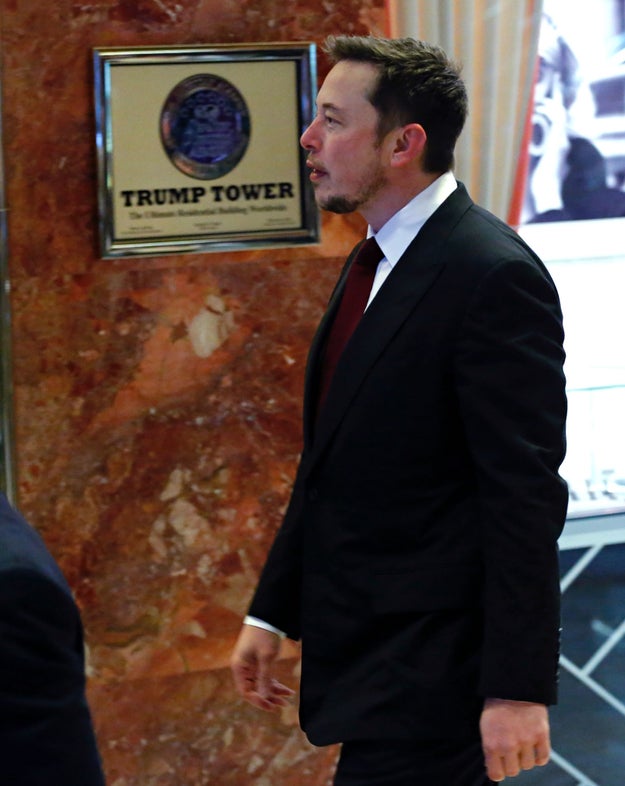
Kena Betancur / AFP / Getty Images
With Martian ambitions but earthly pragmatism, SpaceX spent nearly $2 million on lobbying in 2016, a new high for the gravity defying upstart. The company met with Congress, the Defense Department, and NASA among other federal agencies to discuss issues central to its business like commercial space transportation and NASA funding.
SpaceX Founder Elon Musk was recently tapped by President Trump to serve as an economic advisor, along with Uber CEO Travis Kalanick. Musk met with Trump on Monday along with a cadre of industry chieftains that included Dell CEO Michael Dell and the head of Ford, Mark Fields. During the two-hour meeting, Trump asked the business leaders for ideas to grow the US economy and to list the obstacles preventing them from hiring more workers and expanding their operations, according to White House Press Secretary Sean Spicer.
In 2016, Uber spent nearly $1.4 million lobbying Congress, traffic safety regulators, and US trade officials, nearly tripling its expenditures from the year before, according to federal lobbying disclosures due Monday. The company dwarfed what it spent in 2015, which totaled $470,000.
Not only did Uber cross the $1 million mark for the first time, but it continues to tower over ride-hail rival Lyft, as far as lobbying money is concerned. Lyft spent $250,000 on federal lobbying last year, a significant increase from its 2015 total, at $30,000, but still a way's off from Uber.
AT&T, whose proposed merger with Time Warner was quickly denounced by Trump on the campaign trail, has also spent big in 2016. The media and communications titan racked up $16.4 in lobbying last year, topping its 2015 total by $1.5 million. In the months after the $85.4 billion mega-deal was announced, AT&T spent $3.7 million lobbying the House and the Senate on a wide range of issues including surveillance, arbitration in consumer contracts, and cybersecurity.
While the AT&T-Time Warner deal undergoes a lengthy Justice Department review, the merger may ultimately serve as a major test of Trump&039;s campaign promises. In October, Trump condemned the merger, describing the deal as an undue concentration of media power. Since then, antitrust and media experts have been left pondering whether Trump&039;s initial statements would lead to a White House skeptical of mergers and inclined to shield consumer, or if Trump would simply revert to the traditionally Republican stance of de-regulation.
Earlier this month, Trump appeared to soften his position on the merger, even as he admitted to a lack of knowledge of the deal. “I have been on the record in the past of saying it&039;s too big and we have to keep competition,” he told Axios. “So, but other than that, I haven&039;t, you know, I haven&039;t seen any of the facts, yet. I&039;m sure that will be presented to me and to the people within government.”
With or without Trump&039;s blessing, AT&T must win the approval of the Justice Department to proceed, but it is unclear who will lead the agency&039;s antitrust division. Whoever is chosen to fill that role, like the attorney general, requires senate confirmation. Trump&039;s pick for the nation&039;s chief lawyer and law enforcement officer, Sen. Jeff Sessions, has not yet been approved by the Senate.
In the last quarter of 2016, only four corporations in the US spent more money lobbying than AT&T.
Google once again led the tech industry in beltway cash, spending over $3.5 million in the final months of the Obama era. Google was the 6th biggest spender of any corporation, behind only AT&T and a handful of industry giants that included Boeing and Comcast. In 2016 Google spent $15.4 million lobbying on issues like the Trans-Pacific Partnership (nixed by Trump on Monday), immigration, email privacy, and encryption.
Amazon and Microsoft came next. With lobbying expenditures of more than $2.6 million, Amazon ranked 13th overall and second only to Google in tech. The Treasury Department and the Federal Aviation Administration were among the agencies that Amazon lobbied in the fourth quarter of 2016. Amazon&039;s issues included corporate taxation, drone privacy, and #cloud computing. Microsoft ranked third in the tech industry and 16th overall, forking over $2.4 million.
Oracle followed, spending $2 million and ranking 27th overall. Hewlett Packard was close behind at $1.8 million and in the 31st position.
Facebook&039;s lobbying spend was down for both the fourth quarter (compared to 2015) and for the entire year of 2016. Facebook spent $1.7 in the last quarter of 2016 compared to $2.1 in 2015. And the social network tallied $8.7 million for all of 2016, while it spent just under $10 million in 2015. Facebook lobbied the White House, Congress, and federal agencies on high-tech worker visas , terrorism, and government surveillance, in addition to other concerns.
Apple&039;s spending for the quarter and the year roughly tracks its 2015 figures: about $1.4 million for the fourth quarter and $4.7 for the year. Apple&039;s disclosures listed energy efficiency standards, encryption, and the regulation of mobile medical apps as issues the company lobbied. The iPhone maker held meetings with the office of the President, Congress, Homeland Security, and the Commerce Department, among other federal agencies.
Quelle: <a href="SpaceX, Uber Reach New Heights In Lobbying Spending“>BuzzFeed
Published by